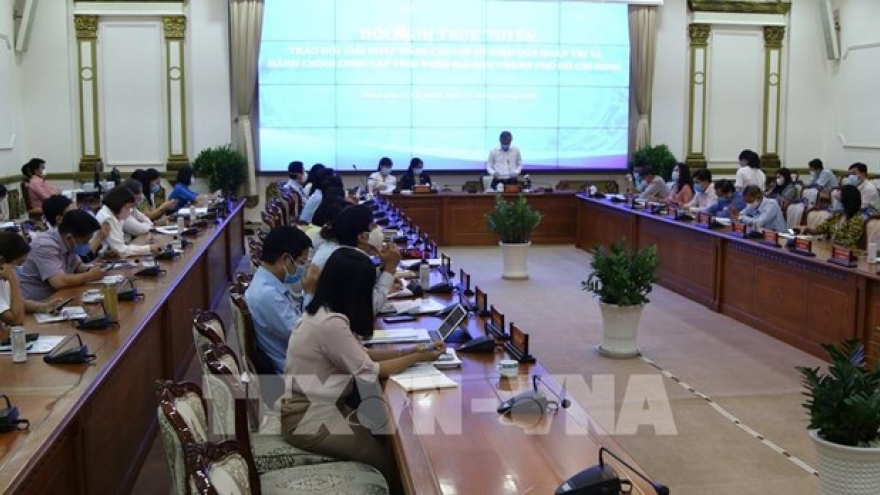2023 PAPI sees improvement in citizen perceptions on local anti-corruption efforts
VOV.VN - The 15th Provincial Governance and Public Administration Performance Index (PAPI) report was released on April 2, indicating progress made in citizen’s perceptions of local anti-corruption efforts and e-governance.

Upon addressing the announcement ceremony, Ramla Khalidi, resident representative of the UN Development Program (UNDP), said the PAPI contributes to inclusive development in the nation, providing a lot of data on demand, as well as people's priorities to give useful information for both the design and implementation of national-level legal regulations and policies. This will therefore better serve people in achieving sustainable development goals.
In particular, Khalidi said UNDP had highlighted three important findings through the 2023 PAPI, including controlling corruption in the public sector, promoting the potential of e-governance, and making positive changes in people's access to the Internet and the level of use of local public service portals compared to 2020.
Although nearly 80% of the PAPI survey respondents in 2023 had access to the Internet at home, the results also highlighted digital divides. Indeed, access to the Internet varies across gender, living areas, ethnicity, and migrant status.
However, findings revealed that citizens have been slow to switch to e-governance, with just 8.3% and 7.6% of the respondents using the umbrella National E-Service Portal (NESP) or Provincial E-Service Portals (PESP) available in all 63 provinces, respectively. A key reason for the limited users is privacy concerns, as stated by one-third of users.
These findings therefore underscore the need for substantial improvements in order to make services more accessible, user-friendly, convenient, and inclusive for all citizen users. A practical measure is to design a single-device approach to online public service portals, thereby enabling users to access them from anywhere with smartphones.
Since its inception 15 years prior, PAPI has collected the voices of 197,779 citizens from all demographic backgrounds on the state of governance and public service provision at a local level.
With its array of quantitative data, PAPI has emerged as a reliable, citizen-centric tool which is used to inform the nation’s legislative and policy agendas and the action plans of all 63 provincial administrations.
In his speech, Duong Trung Y, vice president of the Ho Chi Minh National Academy of Politics (HCMA), highlighted the important results that the HCMA and the UNDP have obtained together during the 15 years of both formulating and developing the PAPI Indicators. These have consistently contributed to positive and systematic changes in the nation’s public administration.
Objective metrics such as PAPI, the Provincial Competitiveness Index (PCI), or the Public Administration Reform Index (PAR Index), therefore serve as important benchmarks for evaluating the overall effectiveness of public service delivery by ministries and local administrations. In addition, they offer important suggestions for the nation as it seeks to advance its national development policy, carry out the National Digital Transformation Strategy, and foster a people-focused and inclusive state, ensuring that no one is left behind, he stated.
A record 19,536 respondents throughout the country participated in the 2023 PAPI survey. Based on their responses, Control of Corruption in the Public Sector and E-Governance were the key PAPI dimensions to register progress relative to 2021 and 2022. Transparency in Local Decision-Making, conversely, suffered a fall. The remaining five dimensions on local governance, public administration, and service delivery also saw little change relative to the preceding two years.
With corruption high on the agenda for both the Party and citizens, the results on Control of Corruption in the Public Sector and Transparency in Local Decision-making are significant, despite painting contrasting pictures.
The improvement made in citizen perceptions on control of corruption at a local level increased only modestly, from 6.71 points in 2022 to 6.77 in 2023. This slight improvement, however, aligned with citizen rankings of national issues of greatest concern. Indeed, corruption dropped from being the fifth national issue of greatest anxiety for citizens in 2022 to the sixth in 2023.
Citizens reported a perceived decline in five out of the eight types of corruption measured by PAPI. These are the diversion of state funds, bribes for land use rights certificates, bribes to avoid environmental regulations, bribes for teachers' favouritism, and bribes for better public health service.
Despite this progress, more respondents believed that informal payments were needed to secure State employment in 2023 compared to 2021.


